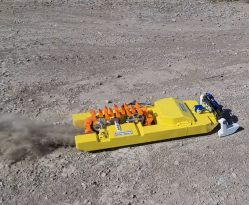Taildraggers remain a popular configuration for small aircraft, but they come with a significant risk during ground handling: ground loops. If the tail gets too far off course, it can swing around completely, often damaging or destroying aircraft if a wing hits the ground. Avoiding ground loops requires good rudder and brake control, and there currently isn’t a good way to learn it without getting into an actual aircraft. [Trent Palmer] is a pilot and who has been thinking about this problem for a few years, so he built a 3-wheeled electric go-cart to help pilots train their ground handling.
The cart is controlled exactly like a taildragger, with a pair of rudder pedals connected to the single steerable via cables, and springs to add some response delay. Independent hydraulic brakes on each main wheel, operated by toe pedals, further simulate the control on many aircraft. The main wheel are controlled with a throttle lever, with a differential to allow them to rotate at different speeds. The cart is unforgiving, and requires constant corrections with the pedals to keep it going straight.[Trent] had few pilot and non-pilot friends try out the cart, and even the experienced tailwheel pilots got into ground loop. It might be bit too sensitive, but everyone agreed that mastering this cart would significantly improve ground handling skills in actual aircraft.
Repairing a damaged aircraft can cost several thousand dollar, so a cheap training tool like this could prove invaluable flight schools and even individual pilots. [Trent] doesn’t have big plans for commercialization, but we wouldn’t be surprised if it goes that way.
Taildraggers are especially popular as bush planes, with many tracing their heritage from the humble Piper J-3 Cub. We’ve seen some extreme extreme modern bush planes, like [Mike Patey]’s Scrappy and Draco builds. Continue reading “Tailwheel Trainer Go-Cart To Avoid Wrecked Planes”


















